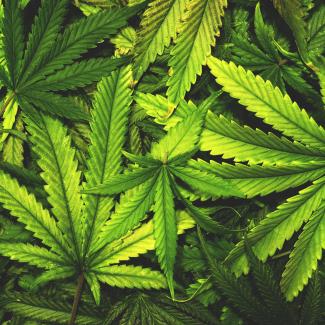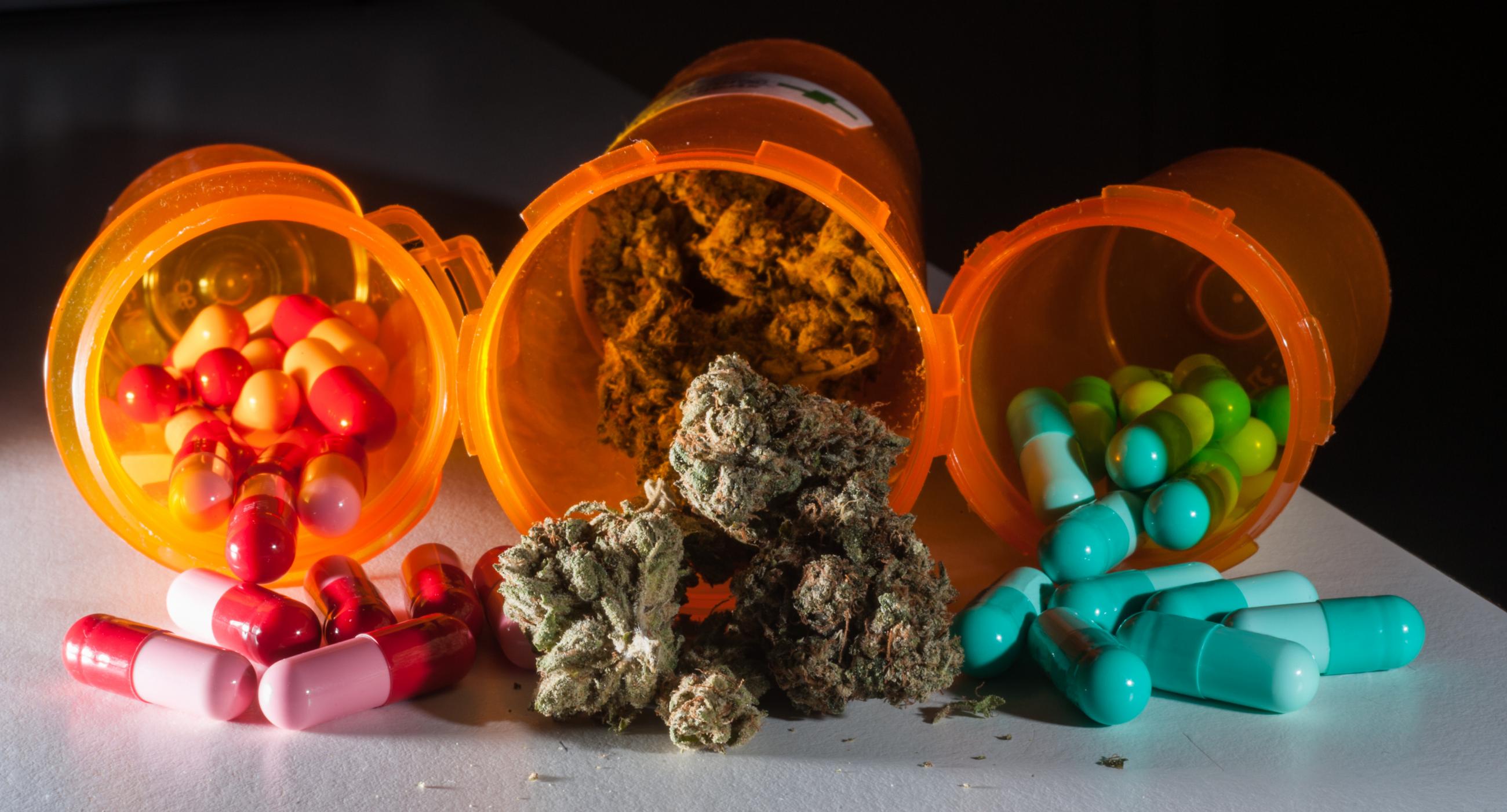Those who suffer from depression are more likely to use cannabis than those who do not, partially due to marijuana’s potential to produce relaxing, stress-relieving, and euphoric effects. Some people with depression also take prescription antidepressants while using marijuana. Although studies are limited regarding the interactions between cannabis and antidepressants, physicians and patients must be aware of the potential side effects of this combination.
IS IT DANGEROUS TO MIX MARIJUANA AND ANTIDEPRESSANTS?
The risks of mixing marijuana and antidepressants are impacted by the class of the antidepressant. Overall, in early studies conducted on the topic, there have been limited cases of interactions seen between psychoactive drugs and psychotropic medications. A 2010 review in the National Library of Medicine titled “Psychotropic Medications and Substances of Abuse Interactions in Youth'' suggests that there have been few reports of unfavorable effects between the two. This research suggests that significant interactions occur somewhat rarely. However, early research suggests that certain classes of antidepressants may have potentially adverse side effects with marijuana. Additionally, the aforementioned review regarding psychotropic medications notes that it is possible for patients to fail to notice their side effects or resist disclosing their use of cannabis to researchers, which may contribute to the lack of documented interactions. Additionally, the review points out the notably higher therapeutic index of newer psychotropic medications, meaning newer antidepressants may have lower or more moderate cannabis interaction risks than their older counterparts.
However, other early research shows that mixing antidepressants with cannabis may have some potential dangers, including decreased effectiveness of antidepressants. Because cannabinoids like cannabidiol (CBD) and tetrahydrocannabinol (THC) may inhibit the liver enzyme cytochrome P2C19 (CYP2C19), marijuana may decrease the metabolism of CYP2C19 substrates, such as escitalopram and sertraline.
Additionally, a 2007 study conducted by McGill University showed that THC may activate serotonin receptors and inhibit serotonin reuptake, and a 2018 article in the National Library of Medicine suggests that CBD may modulate serotonin transmission. This means that cannabinoids may impact serotonin receptors, so mixing antidepressants (specifically SSRIs) with marijuana may result in some positive and/or negative side effects. Potential risks of this interaction include impaired antidepressant metabolism, the worsening of depression symptoms (primarily when cannabis is consumed in high doses), and rarely, serotonin syndrome (potentially life-threatening levels of serotonin in the brain).
Another potential danger of mixing marijuana with antidepressants is a higher chance of abandoning antidepressant treatment protocols. The aforementioned National Library of Medicine article suggests that patients suffering from severe depression have already shown to be less likely to adhere to their treatment plans, including therapy and the routine use of antidepressants.
Regarding antidepressants and cannabis use, it is important to note evidence suggesting that patients are more likely to misuse marijuana or become chronic marijuana users when depressed. A 2007 study titled “Does occasional cannabis use impact anxiety and depression treatment outcomes?” suggests that people with depression and/or anxiety tend to consume cannabis at rates two to eight times greater than those who do not suffer from these conditions.
Also, ingesting or smoking marijuana while on antidepressants may make it more difficult for physicians to assess the effectiveness of each individual medication. Therefore, it is recommended to start with one type of treatment and add others only after evaluating the first medication’s efficacy. When stopping marijuana use, even for a short period of time, some patients on antidepressants reported an improvement in both daily functioning and mood. However, more research is necessary to confirm this correlation.
Additionally, although low doses of THC have been shown to produce favorable effects like relaxation and euphoria, high doses have the potential to increase anxiety and even induce a panic attack.
Therefore, if consuming marijuana while taking antidepressants, it is important to consult with your prescribing physician and marijuana doctor to lower your chances of experiencing adverse side effects.
MARIJUANA AND ANTIDEPRESSANTS SIDE EFFECTS
Antidepressants fall into multiple classes depending on which neurotransmitters they target and what they do. Because each class of antidepressants is unique, marijuana use may result in varying effects, both positive and negative.
In terms of marijuana’s reaction with antidepressants, cannabinoids may also help offset some of the side effects of antidepressants including GI upset, headaches, loss of appetite, nausea, and sleep problems. A 2020 article published in Frontiers provides some evidence that both CBD and THC may increase the amount of serotonin available in the brain, and marijuana has been shown to contain numerous stress-reducing and mood-enhancing terpenes, which may help treat depression. CBD may also have antipsychotic properties. However, it is important to also be aware of the adverse marijuana and antidepressant side effects that may stem from these interactions.
TYPES OF ANTIDEPRESSANTS AND THEIR INTERACTIONS WITH CANNABIS
A synopsis of the potential risks of mixing various types of antidepressants with marijuana can be found below.
Selective Serotonin Reuptake Inhibitors (SSRIs)
SSRIs are the most commonly prescribed antidepressants. Examples include citalopram (Celexa, Cipramil), dapoxetine (Priligy), escitalopram (Cipralex, Lexapro), fluoxetine (Oxactin, Prozac), fluvoxamine (Faverin, Luvox), paroxetine (Paxil, Seroxat), sertraline (Lustral, Zoloft), and vortioxetine (Brintellix, Trintellix). With regards to SSRIs and marijuana, a 2021 article in the National Library of Medicine incorporates data suggesting that mixing cannabis with certain SSRIs, such as sertraline and citalopram, may heighten the common side effects of marijuana, including dry mouth, dizziness, and difficulty sleeping. However, overall, SSRI patients have reported minimal adverse side effects when mixing SSRIs with marijuana, so the interaction between marijuana and SSRIs is most likely minimal. There is typically a low to moderate risk when using cannabis while taking SSRIs.
Serotonin and Norepinephrine Reuptake Inhibitors (SNRIs)
SNRIs are a relatively new class of antidepressants. Common SNRIs include desvenlafaxine (Pristiq), duloxetine (Cymbalta), levomilnacipran (Fetzima), and venlafaxine (Effexor XR). There have been minimal reports of adverse interactions between marijuana and SNRIs. Because negative side effects are rare, SNRIs have a low to moderate cannabis interaction risk.
Norepinephrine and Dopamine Reuptake Inhibitors (NDRIs)
NDRIs are known as one of the few antidepressants that do not typically produce negative sexual side effects. Bupropion (Aplenzin, Wellbutrin, Forfivo XL) is a common NDRI. NDRIs are occasionally prescribed to help patients manage ADHD and/or quit smoking in addition to treating depression. Very few adverse interactions between marijuana and NDRIs have been reported, so the risk level is low to moderate.
Monoamine Oxidase Inhibitors (MAOIs)
MAOI treatment has decreased in popularity due to its high potential for adverse interactions with various substances. MAOI examples include isocarboxazid (Marplan), phenelzine (Nardil), and tranylcypromine (Parnate). Despite the lack of case reports specific to the interactions between MAOIs and marijuana, MAOIs have been shown to cause potentially dangerous side effects when interacting with many other medications and foods. Therefore, MAOI patients are not recommended to use marijuana during treatment, as the potential interaction risk is high.
Tricyclic Antidepressants
Tricyclic antidepressants are typically reserved for patients who have proven unresponsive to other treatments. Common tricyclic antidepressants include amitriptyline (Elavil), doxepin (Silenor), imipramine (Tofranil), and trimipramine (Surmontil). Tricyclic antidepressants have been reported to result in fewer negative side effects than MAOIs but more commonly adverse side effects than newer antidepressants. Case reports have shown that mixing tricyclic antidepressants with cannabis may result in tachycardia (a fast heart rate). Tachycardia may potentially be life-threatening, so the potential risk of mixing tricyclic antidepressants with cannabis is high. Therefore, physicians do not typically use tricyclic antidepressants to treat depression in cannabis users.
Sedatives
Although sedatives are not technically antidepressants, many patients suffering from depression are also prescribed sedatives to treat their symptoms. Common sedatives include clonazepam (Klonopin, Rivotril), lorazepam (Ativan), phenobarbital (Donnatal, Luminal), and zolpidem (Ambien). Both sedatives and marijuana have been shown to induce drowsiness, so mixing them may worsen these effects. The risks are even greater for patients suffering from severe depression and/or bipolar disorder. Overall, the interaction risk between sedatives and cannabis is high.
Similar to when mixing marijuana and antibiotics, patients should consider the risks of mixing cannabis with antidepressants and are recommended to consult with a physician.
CAN MARIJUANA REPLACE ANTIDEPRESSANTS?
A 2021 study in Harm Reduction Journal contains some evidence suggesting that marijuana may be used to reduce antidepressant intake. For some patients, cannabis may have the potential to replace antidepressants, but more commonly, a properly-dosed combination of antidepressants and marijuana seems to be a more effective method. A 2020 study published in the Yale Journal of Biology and Medicine features reports of marijuana providing immediate (yet temporary) relief from depression and its symptoms. When using marijuana to help with depression, patients are recommended to choose strains that are high in CBD, as early evidence has shown that CBD may be able to combat depression. Cannabis may also help patients manage anxiety, which is often associated with depression. Additionally, when taken together, cannabis may help ease the side effects of antidepressants, including GI upset, headaches, loss of appetite, nausea, and sleep problems.
Regarding the effects of antidepressants vs. marijuana, some individuals have reported finding relief from depressive symptoms and antidepressant side effects when combining two. Proper dosing is necessary, and it is recommended to consult with a healthcare professional if you intend to use medical cannabis while taking antidepressants.
FAQ
Is marijuana an antidepressant or a depressant?
Marijuana produces varying effects in different patients, so it may be classified as a depressant, stimulant, or hallucinogen. As a depressant, marijuana may slow brain function, ease anxiety, relax muscles, bring about short-term memory loss, and cause dizziness and sleepiness. As a stimulant, marijuana may cause paranoia, anxiety, mood elevation, and tachycardia. As a hallucinogen, marijuana may bring about hallucinations, nausea, a loss of coordination, an altered sense of time or space, dry mouth, tachycardia, and a detachment from oneself or one’s environment.
Does marijuana interact with antidepressants?
Interactions between marijuana and antidepressants vary among different antidepressant classes. Overall, in the limited studies conducted on the topic, there have been few life-threatening interactions seen between psychoactive drugs and psychotropic medications. However, some potential risks have been reported, so supervision from a physician is recommended.
Is marijuana more effective than antidepressants?
For some patients, cannabis may have the potential to replace antidepressants, but more commonly, a properly-dosed combination of antidepressants and marijuana seems to be a more effective method.
Can I smoke marijuana on antidepressants?
It is safer to use marijuana with some antidepressants than others. Typically, the potential cannabis interaction risk is lower for SSRIs, SNRIs, and NDRIs, and higher for MAOIs, tricyclic antidepressants, and sedatives.
What happens if you mix marijuana and antidepressants?
Because each class of antidepressants is unique, marijuana consumption may result in varying side effects for each antidepressant class.
























